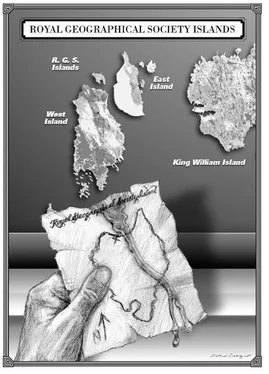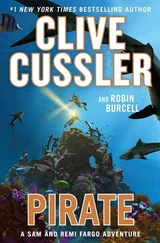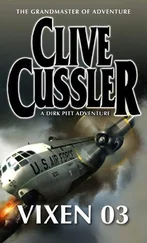Gunn’s face softened. “You’d better have found something for surfacing so late.” His gaze became like that of a kid in a candy store. “Did you see indications of a mineral field?”
“A large one, by the looks of it,” Giordino replied, nodding. “We only saw a section of it, but it appears widely dispersed.”
“And the electronic sensors? How did the Bloodhound perform? ”
“She was barking like a coyote under a full moon,” Dahlgren replied. “The sensors diagnosed over thirteen different elements.”
“We’ll have to leave it for the lab analysis to determine the Bloodhound ’s accuracy,” Giordino added. “According to the sensors, that soggy rock you’re holding is chock-full of manganese and iron.”
“There’s probably enough of that stuff littering the bottom to buy you a thousand Bloodhound s, Rudi,” Dahlgren said.
“Did the sensors indicate any gold content?” Gunn asked.
Giordino’s eyes rolled skyward, then he turned to leave the ops center.
“Everybody thinks I’m Midas,” he grumbled before disappearing out the door.
The spring storm was not widespread but packed the concentrated punch of a heavyweight boxer as it rolled southeast across the Beaufort Sea. Pummeling wind gusts of over sixty miles per hour blew the falling snow in horizontal sheets, turning the flakes to hardened particles of ice. Gusting swirls spread thick curtains over the white ice, often plunging visibility down to zero. The already hostile environment of the Arctic north became a place of brutal savagery.
Kevin Bue listened to the frames of the mess hall creak and shudder under the bristling gale and idly contemplated the structure’s strength rating. Draining the remains of a cup of coffee, he tried to concentrate on a scientific journal spread open on the table. Though he had experienced a dozen storms during his tenure in the Arctic, he still found their ferocity unnerving. While the rest of the crew went about their jobs, Bue found it hard to focus when the entire camp sounded like it was about to blow away.
A heavyset cook and part-time carpenter named Benson sat down at the table across from Bue and sipped at his own steaming mug of coffee.
“Pretty good blow, eh?” he said, grinning through a thick black beard.
“Sounds like it’s about to take us along with it,” Bue replied, watching the roof overhead swaying back and forth.
“Well, if it does, I sure hope it deposits us somewhere where the weather is warm and the drinks taste better cold,” he replied, sipping at his coffee. Eyeing Bue’s empty cup, he reached over and grabbed the handle, then stood up.
“Here, let me get you a refill.”
Benson walked across the mess to a large silver urn and refilled the cup. He started back toward Bue, then suddenly froze with a quizzical look on his face. Above the din of the buffeting wind, he detected a low-pitched mechanical churn. That wasn’t what bothered him, though. It was the sharp crackling sound accompanying it that struck a nerve deep in his gut.
Bue glanced up at Benson, then picked up on the sound as well. The noise was drawing upon them rapidly, and Bue thought he heard a shout somewhere off in the compound before his whole world collapsed around him.
With a crunching jar, the back wall of the mess hall completely disintegrated, replaced by a massive gray wedge. The towering object quickly surged through the room, leaving behind a thirty-foot swath of destruction. Torn free from its supports, the hut’s roof flew off in a gust, while a blast of cold air flooded the interior. Bue looked on in horror as the gray mass devoured Benson in a spray of ice and froth. For one moment, the chef was standing there holding a mug of coffee. In the next instant, he was gone.
The floor buckled up beneath Bue, throwing him and the table toward the entry door. Struggling to his feet, he stood and stared at the gray behemoth that materialized before him. It was a ship, his jumbled mind finally fathomed, storming through the center of the camp and the thin ice beneath it.
The swirling, snowy winds gave the vessel a ghostly appearance, but he was able to make out a large number 54 painted in white on the bow. As the bow burst past with a deep rumble, Bue caught a glimpse of a large American flag rippling from the ship’s masthead before the vessel disappeared into a cloud of white. He instinctively staggered back toward it, calling out for Benson, until nearly stepping into a black river of water that now trailed the ship.
Dazedly shaking off his state of shock, Bue pulled on his parka, which lay crumpled on the ground, and stepped past the remains of the entryway. Fighting his way against the winds, he tried to assess the condition of the camp while noting that the ground beneath his feet seemed to sway in an odd manner. Circling a few dozen feet to his right, he stopped at a ledge where the ice dropped away to open water. Just beyond him was where all three bunkhouses had stood. Now they were all gone, replaced by scattered chunks of ice floating in the dark water.
Bue’s heart sank, knowing that one of his men had been off duty and asleep in his bunk just a short time before. That still left two men unaccounted for — Case the radio operator and Quinlon the maintenance man.
Bue turned his attention toward the lab building, catching sight of the structure’s blue walls still standing in the distance. Struggling to move closer, he nearly fell into the water again, finding a lead in the ice that separated him from the lab. Against his better judgment, he took a running leap and hopped over the three-foot chasm, falling hard to the ice on the opposite side. Willing himself forward, he staggered into the wind until reaching the threshold. Resting briefly, he burst through the door, then froze.
The interior of the lab, like the mess hall, had been obliterated by the passing ship. Little remained standing beyond the doorway, just some scattered remains floating in the water a few feet away. Miraculously, the radio shack had somehow survived the blow, severed from the main building but still standing upright. Through the whistling wind, Bue could hear Case’s voice calling out a plea for help.
Stepping closer, Bue found Case seated at his desk talking into a dead radio set. The ice camp’s power generators, stowed in the storage building, had been one of the first things to sink when the ship charged through. There was no power left in the camp, nor had there been any for several minutes.
Bue put his hand on Case’s shoulder and the radioman slowly set down the transmitter, his eyes glazed with fear. Suddenly a crackling sound erupted beneath them and the ground began to shudder.
“It’s the ice!” Bue shouted. “Get out of here now.”
He pulled Case to his feet, and the two men scrambled out of the shack and across the ice as the crackling sound seemed to chase them. They hopped over a low rise and turned to see the ice beneath the lab and radio hut shatter like a cracked mirror. The surface splintered into a dozen chunks of loose ice that quickly fell apart, causing the remains of the structure to dissolve into the water below. In less than two minutes, the entire camp had disappeared before Bue’s eyes.
As the two men stared blankly at the destruction, Bue thought he heard the shout of a man above the wind. Peering through the blowing maelstrom, he strained to hear it again. But first his eyes caught sight of a figure flailing in the water, near the site of the radio shack.
“It’s Quinlon,” Case yelled, also spotting the man. Regaining his composure, Case bolted toward the struggling maintenance man.
Quinlon was rapidly losing a fight against shock from immersion into the icy water. Laden by his parka and boots, he would have quickly sunk had he not been able to grab hold of a floating chunk of ice. He quickly lost the energy to pull himself out of the water but propelled himself toward Bue and Case with his last ounce of effort.
Читать дальше












